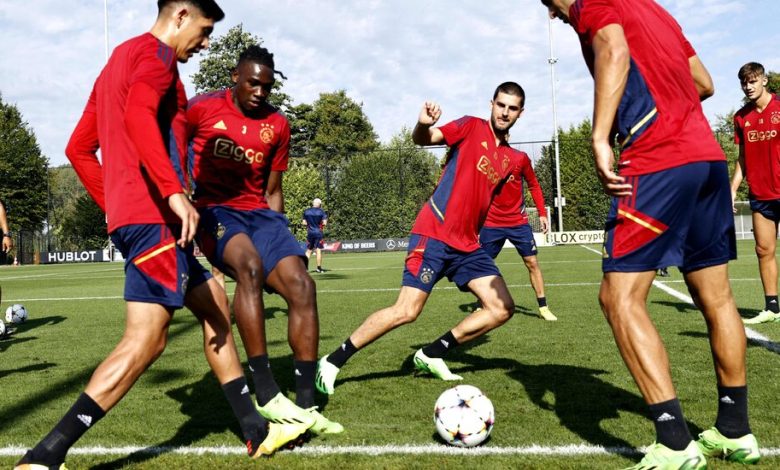At Soccer’s Best Talent Factory, the Future Is Always Now

THE HAGUE, the Netherlands — As a rule, Arco Gnocchi regards himself as too old to buy a replica jersey with his favorite Ajax player’s name emblazoned across the back. Such displays of hero worship, he feels, are not entirely becoming of a person ticking through their early 40s. “Generally,” he said, “it’s for kids.”
This summer, though, for the first time in roughly a decade, Gnocchi made an exception. The jersey he bought for the new season bears the No. 9 and, above it, the surname of Brian Brobbey, Ajax’s bullish, bustling 20-year-old forward. Brobbey struck him as the perfect choice. “He exemplifies everything Ajax embodies at the moment,” he said.
That includes the fact that, in a couple of years at most, Gnocchi expects Brobbey to render his jersey obsolete. Brobbey has already left Ajax once — as a teenager, for an unhappy spell at the German club RB Leipzig — and, if things go to plan, he will leave again soon enough. “He is massively talented,” Gnocchi said. “He’ll be gone by the time he’s 23.”
That is how business has worked at Ajax for as long as anyone can remember. It has long been a place players come from, perhaps the most prolific, reliable, high-caliber talent factory in world soccer. Ajax has seen Johan Cruyff and Marco van Basten and Dennis Bergkamp and Wesley Sneijder and Frenkie de Jong and countless others come. And, for half a century, it has watched them all go, too.
In that sense, this summer was no different. The transfer window began with Edwin van der Sar, the club’s former goalkeeper who is now its chief executive, fondly bidding farewell to the goalkeeper André Onana — who departed for Inter Milan — and the right back Noussair Mazraoui, who was destined for Bayern Munich. He did not even seem especially fazed by the prospective loss of Ryan Gravenberch, a gifted 20-year-old midfielder, who soon followed Mazraoui to Munich. “He has a wish to leave,” van der Sar said.
His serenity was no surprise. Ajax does not operate under any illusions. It expects players to leave. It budgets for it, plans for it and to some extent relies on it. “It’s a steppingstone team,” said Gnocchi, host of the “Pak Schaal” podcast, the most popular Ajax podcast in the Netherlands. “That can be difficult to accept, but if we’re a steppingstone team, at least we’re the best steppingstone team.”
By the end of August, though, the mood among the club’s hierarchy had shifted. The departures had not stopped with Mazraoui, Onana and Gravenberch. Sébastien Haller, the focal point of Ajax’s forward line, had gone to Borussia Dortmund. The defender Perr Schuurs had joined Torino in Italy. Nicolàs Tagliafico, the long-serving left back, had left for Lyon.
The two that hurt, though, were Antony — a vibrant, virtuoso Brazilian wing — and Lisandro Martínez, a gritty, combative Argentine defender, an undoubted fan favorite. “He’s the sort of player who plays with his teeth bared,” said Marcel Stephan, a writer who has been watching Ajax since the late 1970s. Both Antony and Martínez ended up at Manchester United, where they were reunited with the other significant figure Ajax had lost this summer: Coach Erik ten Hag.
They were not, it is safe to say, sent on their way with the club’s best wishes. Antony had to refused to train to force his move — and even then, Ajax held out sufficiently to force United to pay $101 million for his signature — while Martínez reportedly confronted the sporting director Gerry Hamstra over the club’s perceived unwillingness to let him leave.
Even as Antony’s departure loomed, ten Hag’s replacement as coach, Alfred Schreuder, had already made clear that he felt there had been too much change. “We’ve already let a lot of players go,” he said as he faced up to the prospect of losing the Brazilian. “We want to keep a strong squad. New players have arrived, and we have told them what our plans are.”
The solace, for the club, is obvious. Ajax’s annual budget stands in the region of $170 million. The sales of Martínez and Antony alone generated around $150 million. That money allowed Ajax not only to break the Dutch transfer record to sign Steven Bergwijn from Tottenham, but to afford a wage bill that far outstrips any of its domestic rivals. That financial advantage has helped Ajax win every Eredivisie title that was awarded since 2019.
The impact on Ajax’s fans is more complex, an almost perfect distillation of all the benefits, blessings, imbalances and iniquities of modern soccer; it is, indeed, hard to think of a club that has been more exposed to the consequences of the sport’s willing obeisance to a ruthless free market.
There is, of course, a sadness, an awareness that — as Gnocchi put it — Ajax’s “success is also its downfall,” a knowledge that the better it is at producing players, the more certain it is that those players will leave.
There is a sense of if only, too: if only Gravenberch could have played alongside de Jong, rather than instead of him; if only Antony had stayed one more year; if only the club was not engaged in what is, inherently, a Sisyphean task. “It is always painful when a player leaves,” said Marjan Olfers, a professor of sport and law at the Free University of Amsterdam and a former member of Ajax’s supervisory board. “You cannot build a team for five years. You always have to start again.”
Occasionally, perhaps increasingly, there are grumbles. “Anyone who remembers the 2000s and the 2010s is thankful for what we have now,” said Gnocchi, referring to a period when Ajax spent fortunes on mediocrities. “We’re very appreciative of good business, because we know it is possible to buy rubbish in return. But there are fans who feel the club is starting to feel more like a trading company than a soccer team.”
And, certainly, there is plenty of resignation. “We’re used to it,” Stephan said. At 58, he said, after a half-century of following the team, the constant change is nothing new.
Menno Pot, author of “The New Ajax,” a book that examined the club’s transformation in recent years, noted that — until relatively recently — any player leaving the club would be granted an emotional farewell. “We’d let off fireworks, fan groups would present players with presents,” he said. “We figured out a while ago there was no need. The players were going to leave. These are short-term relationships.”
That, more than anything else, is what has been lost: the connection to Ajax’s role as a club that “educates young players, rather than acquires them,” as Olfers put it. Ajax fans, in general, “find it harder to identify with individual players,” she said. “It is more about the club.”
Gnocchi might have gone for Brobbey on the back of his jersey, but he believes the most popular shirt in the stands at Ajax’s stadium is not that of a budding homegrown superstar but Dusan Tadic, the club’s veteran playmaker. Tadic is 33 now. He is contracted to the club until he is 36. He is that rarest of things: a safe bet.
But there is also a pride in knowing that Ajax is producing, in vast quantities, a raw material that the world’s richest clubs crave. “There is a beauty to it,” Pot said. There is hope, too, in great abundance, a confidence that tomorrow will be no worse than today, and might even be better.
Most crucially, there is a sense of identity. The names on the jerseys may be fleeting, but the club itself stands for something that it once feared it had lost forever. That, more than anything, gives fans something to cling on to when everything else is in permanent flux.
“I think, after the Bosman ruling in 1995, Ajax went through an identity crisis,” Pot said. “We did not know how to be Ajax any more. You heard it said that we could never compete in Europe again, that winning the Champions League just was not possible. And people were mostly OK with that.
“But over the last few years, they have found the answer to that question. They have figured out how to be Ajax in the modern world. We have to rebuild completely every three years, and every once in a while we get a truly great team, one that could just go all the way. And when we do, it is something that is completely our own.”




